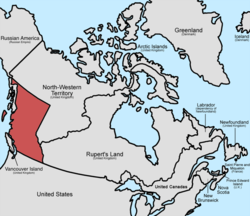Colony of British Columbia (1858–1866)
| Colony of British Columbia | ||||||||
| British colony | ||||||||
|
||||||||
| Capital | New Westminster | |||||||
| Languages | English | |||||||
| Government | Constitutional monarchy | |||||||
| Queen regnant | Queen Victoria | |||||||
| Historical era | British Era | |||||||
| • | Established | 2 August 1858 | ||||||
| • | Merged with Colony of Vancouver Island to form Colony of British Columbia (1866-1871) | 6 August 1866 | ||||||
|
||||||||
The Colony of British Columbia was a crown colony in British North America from 1858 until 1866. It was founded by Richard Clement Moody, who became the first Lieutenant-Governor of British Columbia from 1858 to 1863. At its creation, it physically constituted approximately half the present day Canadian province of British Columbia, since it did not include the Colony of Vancouver Island, the vast and still largely uninhabited regions north of the Nass and Finlay Rivers, the regions east of the Rocky Mountains, or any of the coastal islands. The Colony of the Queen Charlotte Islands and the Stikine Territory were merged with it in 1863, and it was amalgamated in 1866 with the Colony of Vancouver Island to form a new Colony of British Columbia.
The explorations of James Cook and George Vancouver, and the concessions of Spain in 1794 established British claims over the coastal area north of California. Similar claims were established inland via the explorations of such men as John Finlay, Sir Alexander Mackenzie, Simon Fraser, Samuel Black, and David Thompson, and by the subsequent establishment of fur trading posts by the North West Company and the Hudson's Bay Company (HBC). However, until 1858, the region which now comprises the mainland of the Province of British Columbia was an unorganised area of British North America comprising two fur trading districts: New Caledonia, north of the Thompson River drainage; and the Columbia District, located south of the Thompson and throughout the basin of the Columbia River.
...
Wikipedia


